What is the Secret to a Great Sales Discovery Call?

Key Highlights
A sales discovery call helps determine whether a prospect is a true fit early in the process.
Effective discovery relies on thoughtful questions that uncover deeper needs and motivations.
A structured call flow keeps conversations purposeful and prevents rushed or scattered discussions.
Strong discovery questions reveal challenges, top priorities, and expectations that guide next steps.
Scripts act as conversation guides that maintain flow without sounding scripted.
Effective calls use pacing, layered questioning, and attentive listening to build clarity.
Dos and don'ts help maintain trust, avoid overwhelm, and keep conversations prospect-focused.
SmartCue can enhance post-call follow-ups by turning insights into personalized demos that reinforce the value discussed.
Many sales reps struggle to make discovery calls feel natural and productive. Often unsure of what to ask or how to probe, these calls can feel scattered and rushed. Demos without a strong discovery process are 73% less successful, showing that weak discovery leads to missed opportunities.
When discovery calls lack structure and personalization, they fail to build genuine connections. Prospects expect clarity and relevance from the start, and without a clear approach, reps risk pitching too early or missing key insights.
A weak discovery call can derail the entire sales process, wasting time and damaging trust. This blog will break down the essential elements of a successful sales discovery call, helping you turn each conversation into a productive one.
What is a Sales Discovery Call?
A sales discovery call is your first big chance to connect with a potential client interested in what you offer. It's the starting point of this first conversation in the sales journey, where you determine whether there's a real fit between their needs and your solution. Instead of just talking about your product, the goal is to dig deep into the prospect's pain points, objectives, and what they're looking for while setting the stage for future interactions and building a solid foundation for the relationship.
For example, imagine you're selling a project management tool to a marketing agency. During the discovery call, instead of jumping straight into the features of your tool, you ask relevant questions like, "What's your biggest challenge when it comes to managing client projects?" By understanding their specific pain points, you can tailor the conversation to show how your tool can specifically solve their problems, thereby making the call more focused and valuable for the prospect.
Why Discovery Calls Are Essential in the Sales Process?
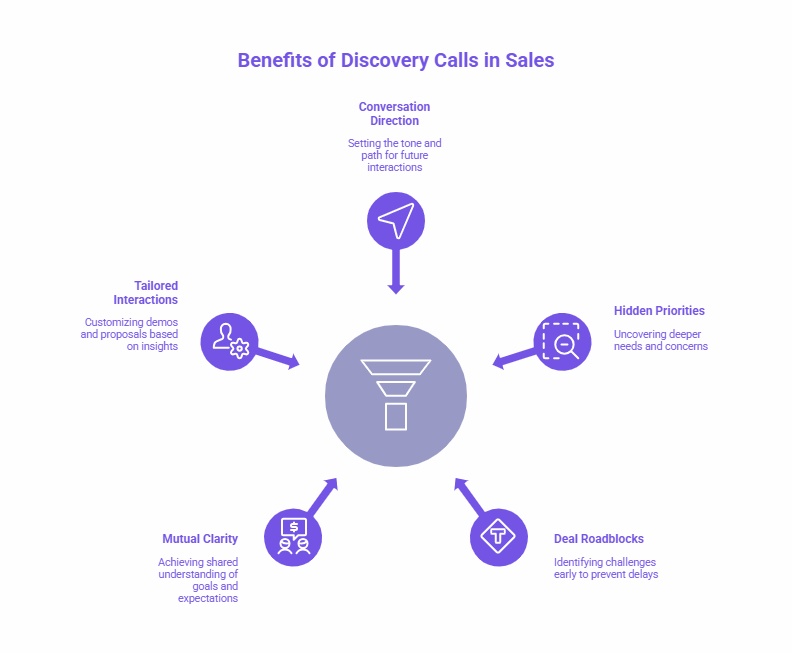
Discovery calls in sales matter a lot because they shape the path of your entire sales conversation before it even begins. Here's how they influence your ability to guide, qualify, and support a prospect with confidence while strengthening the overall health of your sales pipeline.
1. Establishing Conversation Direction
A strong discovery call sets the tone for the entire sales journey by clarifying the value proposition, goals, and context early. This ensures both you and the prospect stay aligned, which is essential to what many sales leaders advocate for, reducing confusion and keeping future conversations focused and purposeful.
2. Revealing Hidden Priorities
Prospects often surface deeper needs only when guided by thoughtful questions. Discovery calls help uncover what truly matters beneath surface-level requirements, allowing you to understand real motivations and decision drivers.
3. Identifying Deal Roadblocks Early
Discovery calls bring potential obstacles to light, such as internal constraints, timelines, or approval processes involving key stakeholders. Addressing these factors early helps prevent stalled deals and unexpected friction later in the sales process.
4. Creating Mutual Clarity
A successful discovery call leaves both sides with a shared understanding of business goals, expectations, and next steps. This mutual clarity builds confidence and ensures conversations move forward with intention rather than assumptions, establishing you as a trusted advisor.
5. Setting Up Tailored Future Interactions
Insights gathered during the sales discovery process help shape how you personalize demos, proposals, and follow-ups. When your next steps clearly reflect what the prospect shared during this sales discovery process, it reinforces trust and makes your approach feel relevant and thoughtful.
Discovery calls set the stage for a successful sales journey by aligning both parties on goals, uncovering key needs, and identifying potential roadblocks early.
What is the Ideal Structure for a Sales Discovery Call?
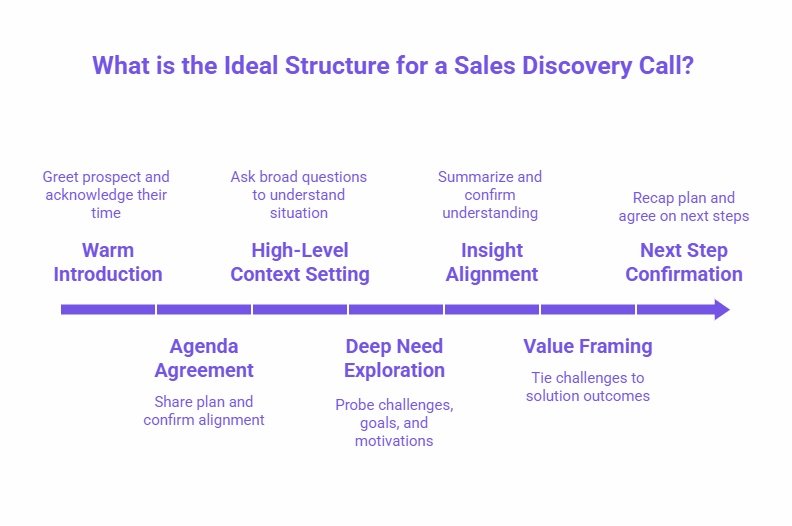
A clear sales discovery call structure prevents the call from feeling rushed or disorganized, and helps you guide the potential customer without sounding scripted. Here's a breakdown of the sales strategy behind running focused, comfortable, and productive discovery conversations that also help you determine whether the prospect is a good fit.
1. Warm Introduction
A relaxed greeting builds comfort and encourages open conversation, preventing the failure of starting off too abruptlyor making the prospect feel rushed.
2. Agenda Agreement
By confirming the agenda early, you ensure both sides are aligned, avoiding the failure of losing direction or missing key discussion points throughout the call.
3. High-Level Context Setting
Asking broad questions early helps establish context and prevents the failure of going too deep too soon, which can overwhelm the prospect or derail the conversation.
4. Deep Need Exploration
Probing for challenges and goals reveals the true problems your solution must solve, including the root cause of these issues, preventing the failure of jumping into a pitch too early and missing the opportunity to uncover deeper needs.
5. Insight Alignment
Summarizing and confirming what you've heard helps clarify any miscommunication, preventing the failure of misunderstanding the prospect's needs or wasting time on irrelevant solutions.
6. Value Framing
Tying their challenges to your solution without diving into a full pitch builds relevance, preventing the failure of overloading them with details or losing focus on their immediate needs.
7. Next Step Confirmation
Closing with a clear recap and agreed next steps ensures momentum, preventing the failure of ending without directionor leaving the prospect uncertain about what comes next.
A strong sales discovery call follows a simple, intentional flow that builds trust, uncovers real needs, and ends with clear direction, without ever feeling scripted or rushed.
Discovery Call Script Example
A well-crafted discovery call script helps ensure that your initial conversations with leads are focused, structured, and productive. While every sales call may differ slightly based on the prospect, this script serves as a strong starting point to guide the conversation and uncover valuable insights.
Sales Rep: Hi [Prospect’s Name], this is [Your Name] from [Your Company]. How’s everything going today? Is this still a good time to chat?
Prospect: [Response]
Sales Rep: Great, thank you for your time today. I’d like to understand your needs a little better. If we’re a good fit, we can talk about next steps, but if it turns out we’re not the right solution, no worries at all. Does that sound okay?
Prospect: [Response]
Sales Rep: Perfect! I’m curious; what motivated you to reach out to us? Was it a specific challenge you’re facing, or perhaps something you saw on our website or in a recent webinar?
Prospect: [Response]
Sales Rep: Thanks for sharing that. Can you tell me more about the main business challenges you're currently facing?
Prospect: [Describes problems]
Sales Rep: I see. It sounds like a difficult situation. Could you share a bit more about how long you’ve been dealing with this, and if you’ve tried any solutions in the past? What’s been the result so far? Also, why is addressing this issue so urgent for you and your team?
Prospect: [Provides details]
Sales Rep: It seems like you have some systems in place. What do you feel is holding you back from fully solving these issues with your current tools or processes?
Prospect: [Provides details]
Sales Rep: I appreciate you being open about that. It’s clear that this is an important challenge for your team. We’re coming up on time, but I think it would be beneficial to look at how we can help. Before we wrap up, I’d be remiss not to schedule a more detailed conversation to dive deeper into this.
Prospect: [Provides details]
Sales Rep (if prospect is hesitant or unsure): No problem at all! I really appreciate your honesty. Could you let me know who else from your team is involved in solving this? Is there anything that might prevent them from moving forward if we decide to take the next step?
Sales Rep (if prospect is interested): Awesome! Do you have your calendar with you? Let’s schedule a follow-up meeting with our account executive next week. It’ll take about an hour to go through everything. What day works best for you? I’ll send over a calendar invite and a quick recap of what we discussed today. Let me know if anything doesn’t feel right. How does that sound?
Prospect: [Response]
Sales Rep: Great, [Prospect’s Name]. Thanks again for your time today. I’m excited to explore how we can help you solve these challenges. Have a wonderful day, and I’ll see you next week!
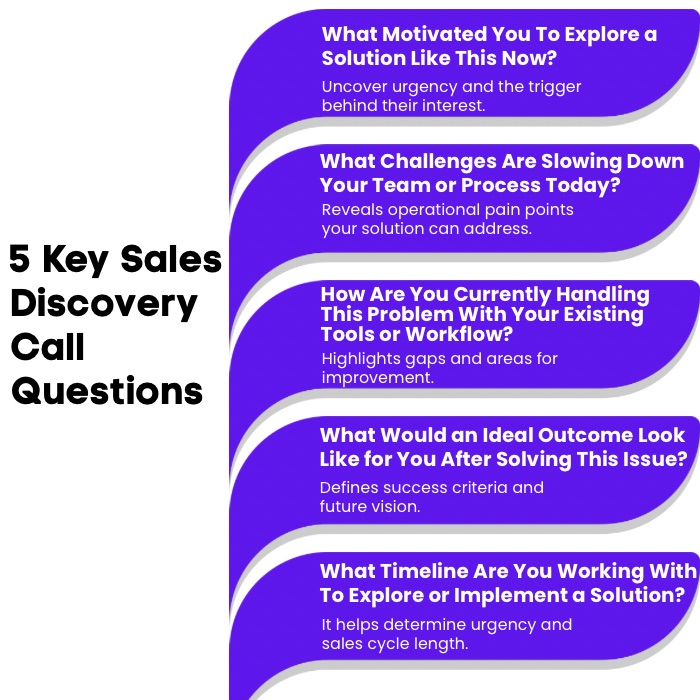
How To Run a Sales Discovery Call Effectively?
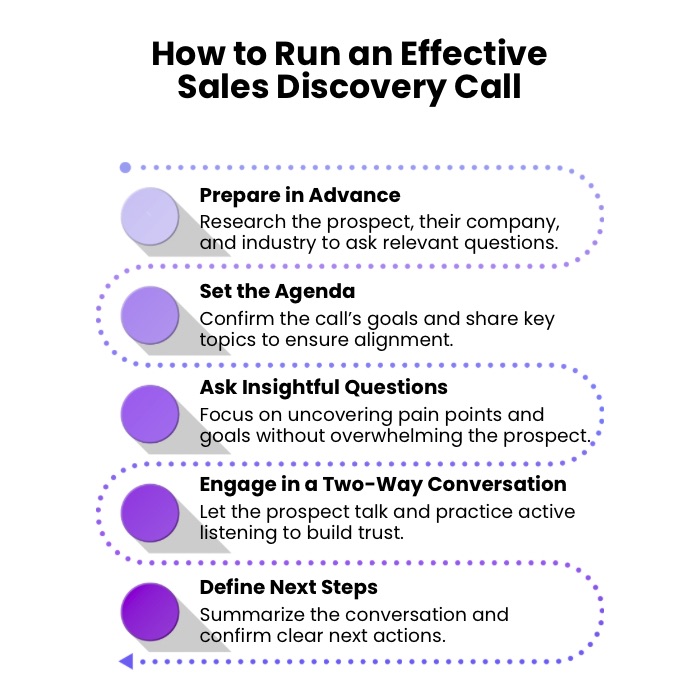
Running an effective discovery call requires preparation, presence, and the ability to guide the conversation with intention. Instead of focusing on selling, the goal is to uncover meaningful insights and understand the prospect's pain points, perhaps by sharing relevant case studies, so both sides can decide whether moving forward makes sense. Here's how to make each call smooth, thoughtful, and insight-driven.
1. Prepare Thoroughly Before the Call
Great discovery calls start with strong preparation. Before engaging with a prospect, take the time to research their business and industry. This enables you to ask relevant, focused questions and ensures you can make the most of the limited time you have.
LinkedIn: Explore the prospect’s role, background, and any recent activity that might provide insight into their interests or needs. See if you have any mutual connections that could help you establish rapport.
Company Website: Familiarize yourself with the prospect’s products, services, leadership, and any recent developments that might be relevant.
Industry Trends: Stay up to date with industry news, trends, and challenges. Understanding their sector’s dynamics will allow you to tailor your questions accordingly.
By doing your homework, you can dive straight into a meaningful conversation, asking questions that will resonate with the prospect’s specific situation.
2. Set Expectations and Agenda Early
To set the tone for a productive conversation, start by confirming the call’s agenda with the prospect. This not only helps keep the conversation on track but also shows respect for their time.
Share a few key topics or goals you plan to cover during the call.
Explain how this conversation benefits them (e.g., uncovering solutions to their challenges).
Send a calendar invite and reminder to reduce the chance of no-shows.
End the conversation by confirming next steps, ensuring that both you and the prospect have clarity on where things will go from there.
3. Ask Insightful Discovery Questions
Your discovery call is an opportunity to gain deep insights into the prospect’s challenges, needs, and goals. Asking the right questions is key to uncovering this information. A strong discovery process can increase conversion rates, so be sure to focus on quality questions that will generate useful responses.
Some key questions to ask:
Could you walk me through your current [process/product] and how it’s been working for you?
What’s the biggest issue you’re facing right now in terms of [pain point]?
What are you hoping to achieve in the next 6 months to a year?
How does this challenge impact your daily operations and goals?
What’s your timeline for finding a solution?
The goal here is to uncover what matters most to the prospect without overwhelming them with too many questions. Give them room to elaborate on the pain points they’re experiencing.
4. Engage in a Two-Way Conversation
Discovery calls should feel like a dialogue, not a monologue. Aim to speak about 50% of the time, and let the prospect share their thoughts, experiences, and frustrations. This approach builds trust and allows you to better understand their needs.
Tips to keep the conversation flowing:
Use open-ended questions to encourage detailed answers.
Practice active listening: paraphrase what they’ve said to ensure understanding and ask follow-up questions.
Show empathy for their challenges with statements like, “That sounds frustrating, I can see why that would be a concern.”
Focus on learning as much as you can, rather than jumping straight into a pitch. The more you understand their world, the more you can tailor your solution to meet their needs.
5. Define Clear Next Steps
Once you’ve explored their needs and challenges, make sure to outline what comes next. Whether it’s scheduling another meeting, sending more information, or offering a product demo, ensure that the prospect knows what to expect moving forward.
End the call by confirming:
The action you’ll take (e.g., sending a proposal or scheduling a follow-up).
A timeframe for the next steps.
Any additional resources they need from you.
By setting clear next steps, you keep the momentum of the conversation going and ensure that both you and the prospect are aligned on what happens next.
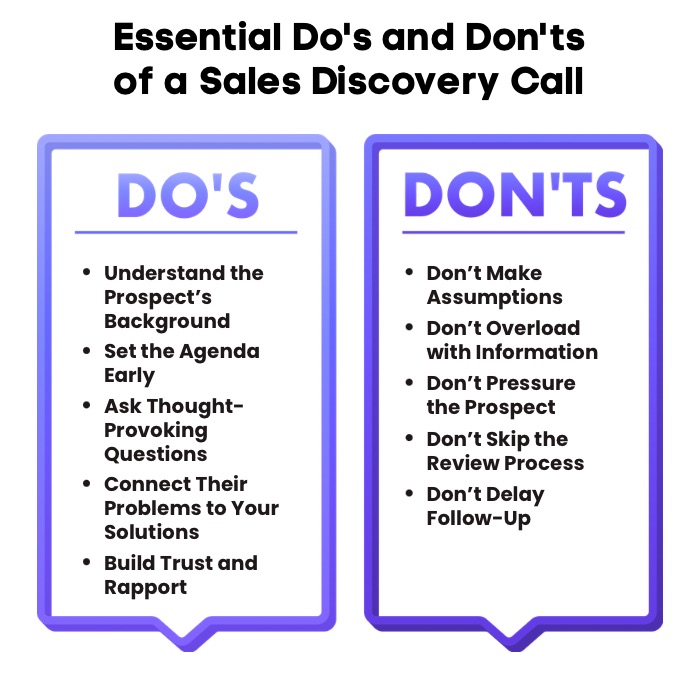
How Can SmartCue Strengthen Your Sales Discovery Calls?
A strong discovery call becomes even more effective when you reinforce what you learned with a clear, personalized product experience. SmartCue helps you do exactly that by turning insights from the call into interactive demos that show prospects how your solution directly addresses their challenges. This creates a seamless flow between understanding their needs and demonstrating meaningful outcomes.
We also allow you to build product demos tailored to the exact pain points and goals your prospect shared during the call. When prospects can visualize the specific value you discussed, it deepens trust and makes your solution easier to understand. This smooth transition from conversation to demonstration makes every part of the sales cycle feel more connected and engaging.
Once you've collected the right insights during the discovery call, SmartCue helps you turn those details into a personalized product walkthrough your prospect can explore at their own pace. This ensures your follow-up feels relevant, timely, and directly tied to the conversation you just had.
Here's a step-by-step guide
Step 1- Log In and Set Up Your Account
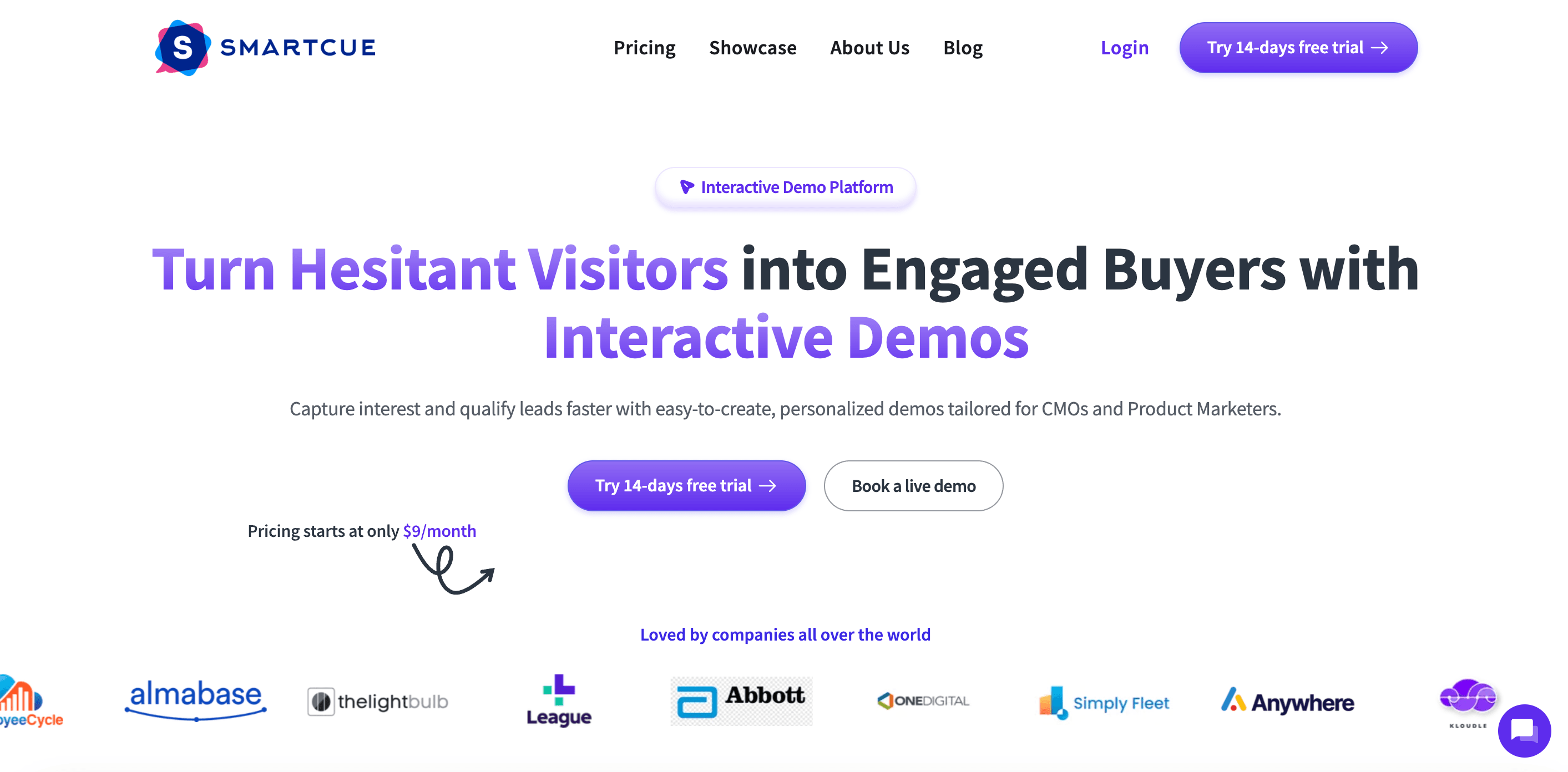
Start your free trial and explore SmartCue's intuitive dashboard. The setup is simple, allowing you to get comfortable with the platform quickly.
Step 2- Build the showcase
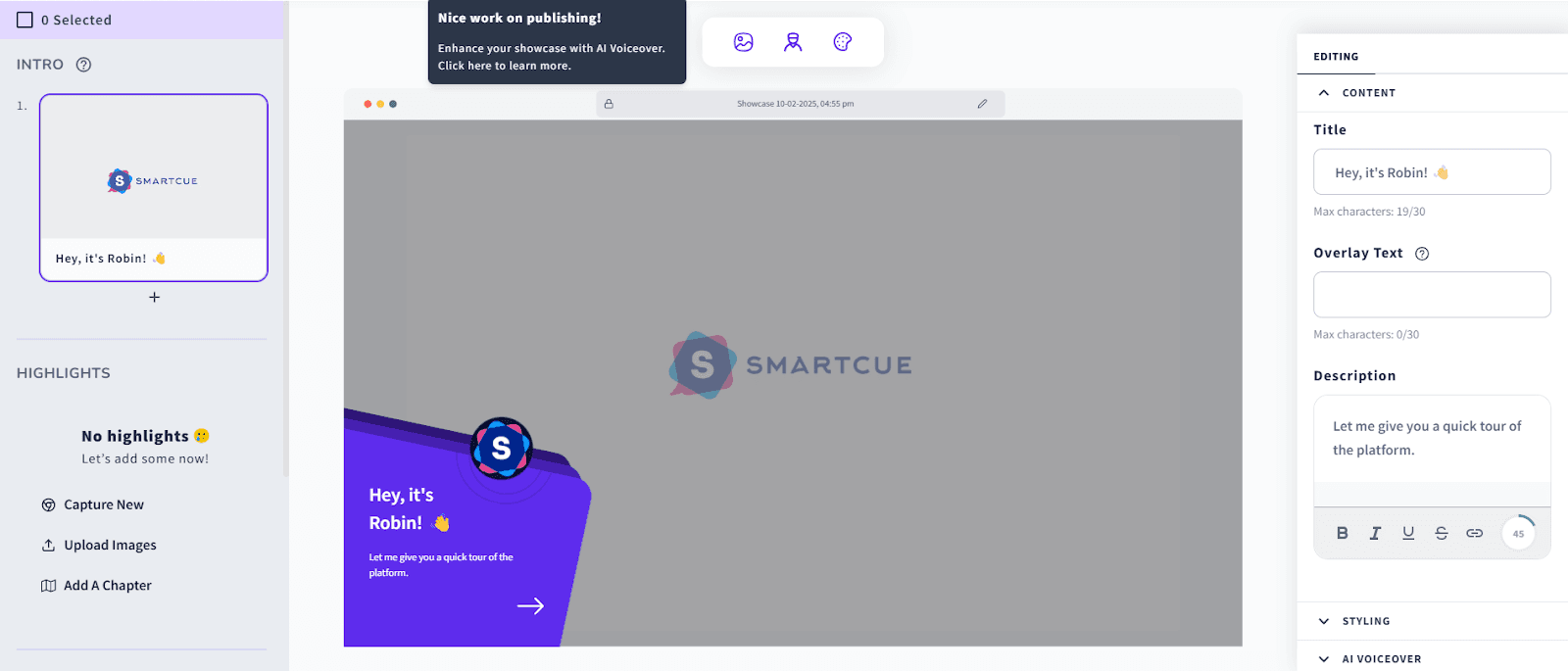
Add text, highlights, and interactive elements that reflect the prospect's specific challenges and priorities. SmartCue helps you create a guided flow that aligns perfectly with the insights gathered from the call.
Step 3- Publish it
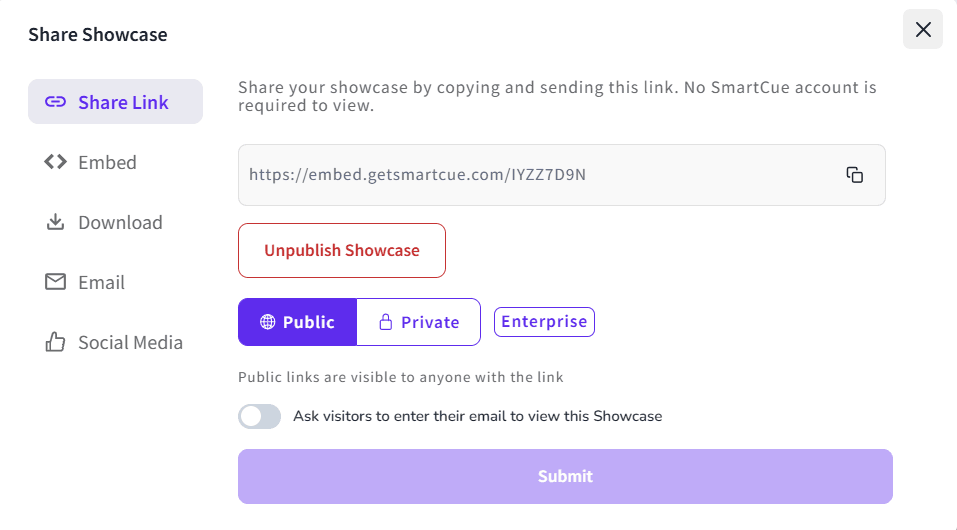
Publish your personalized showcase and send it as part of your follow-up. This gives prospects a focused, relevant walkthrough that reinforces your conversation and strengthens their decision-making.
Ready to turn every discovery call into a clear path to "yes"? Start building personalized, high-impact demos with SmartCue and transform the way prospects experience your product from the very first conversation. Book your SmartCue demo today and close deals with confidence.
Final Thoughts
A great sales discovery call is never about a perfect script. It's about entering the conversation prepared, listening with intention, and guiding the prospect toward clarity. When you ask thoughtful questions and create space for honest dialogue, you uncover insights that make every next step more meaningful. The goal is to understand, not convince, and avoid sounding like an overt sales pitch, so you can shape a solution that genuinely aligns with their needs.
When you reinforce those insights with a clear, personalized product experience afterward, your follow-up becomes stronger, your conversations become more relevant, and your close rates naturally improve. A well-executed discovery call, where you show genuine interest in the client’s needs, doesn't just move a deal forward; it sets the tone for a lasting relationship built on trust and value.
Frequently Asked Questions
What questions can you ask during a discovery call?
Ask open-ended questions about goals, challenges, workflows, and success metrics. These help uncover real needs, identify gaps in their current processes, and position you as someone focused on solving meaningful problems related to the prospect’s pain points rather than pushing a product.
What is the best way to handle objections during a discovery call?
Listen carefully, acknowledge the concern, and respond with clarity and empathy. Use relevant data or examples to address hesitation and explain how your solution aligns with their specific needs without sounding defensive.
Can discovery calls help improve my overall sales strategy?
Yes, discovery calls offer valuable insights into buyer behavior, pain points, and expectations. Asking the right questions during these insights helpcalls helps refine your messaging, improve qualification accuracy, and shape your overall sales approach for higher conversions and more meaningful customer relationships.
What is a discovery call in sales?
A discovery call is the first conversation with a prospect to understand their needs, challenges, and objectives in a way that informs the sales team about how your solution fits and sets the stage for a focused, productive sales process.
How to really run an effective sales discovery call?
Run the call by asking targeted questions, leveraging active listening, and uncovering pain points. Clarify goals, keep the conversation structured and personalized, summarize key insights, and confirm next steps to ensure alignment with the prospect.
How do I properly follow up after a discovery call?
Send a personalized summary highlighting key discussion points, insights, and agreed next steps. Include promised resources and invite further questions to keep the conversation moving and maintain momentum in the sales process by outlining clear next steps.
How long should a sales discovery call typically last?
A well-structured discovery call typically lasts 20–30 minutes, giving you enough time for sales professionals to explore the prospect's goals and challenges without overwhelming them. This duration keeps the conversation focused, meaningful, and productive while maintaining a natural flow.
What tools can help improve sales discovery calls?
Tools with call recording, note-taking, CRM integrations, and interactive demo capabilities help streamline conversations. They allow reps to capture insights accurately and deliver personalized follow-ups aligned with each prospect's needs.
What's the best way to take notes during a discovery call?
The best way to take notes during a discovery call is to capture key points, recurring challenges, and important phrases without disrupting the conversation. Clear, organized notes help you personalize future communication and deliver a more relevant, insightful follow-up.
Comments
Your comment has been submitted